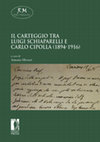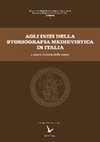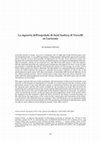Books by Antonio Olivieri

Of the long correspondence between the Veronese Carlo Cipolla, professor of modern history first ... more Of the long correspondence between the Veronese Carlo Cipolla, professor of modern history first in Turin and then in Florence, and his student Luigi Schiaparelli from Turin, more than four hundred letters and postcards remain, in which, for reasons of asymmetry of communication and conservative reasons, those of the student to the master prevail. More than twenty years of dialogue by letter (1894-1916), the publication of which now offers an important contribution of knowledge on the years of apprenticeship and the beginning of Schiaparelli's career, the first great modern scholar of diplomacy and palaeography that Italy has had, and on the contrasting events of the last part of Cipolla's career. This also enlightened various aspects of the history of historical studies in Italy (and partly in Germany) in the decades between the nineteenth and twentieth centuries, until the watershed of the First World War. The correspondence offers endless unpublished glimpses and lively accounts of the figures, events and discussions that animated this intense period of medieval research.
Del lungo colloquio epistolare intrecciato tra il veronese Carlo Cipolla, professore di storia moderna prima a Torino e poi a Firenze, e il suo allievo degli anni torinesi Luigi Schiaparelli, restano più di quattrocento tra lettere e cartoline, in cui prevalgono, per ragioni di asimmetria comunicativa e accidenti conservativi, quelle dell’allievo al maestro. Più di un ventennio di dialogo per lettera (1894-1916), la cui pubblicazione offre ora un importante contributo di conoscenza sugli anni di apprendistato e l’esordio della carriera di Schiaparelli, il primo grande studioso moderno di diplomatica e paleografia che l’Italia abbia avuto, e sulle vicende contrastate dell’ultimo tratto della carriera di Cipolla. Ne risultano illuminati anche svariati aspetti della storia degli studi storici in Italia (e in parte in Germania) nei decenni tra l’Ottocento e il Novecento, fino allo spartiacque della prima guerra mondiale. Il carteggio offre infiniti squarci inediti e resoconti vivaci sulle figure, gli avvenimenti, le discussioni che animarono questa intensa stagione della ricerca medievistica.
Éditions du C.T.H.S., 2018
Le présent volume, consacré à l’enquête générale qui a immédiatement précédé celle de Leopardo da... more Le présent volume, consacré à l’enquête générale qui a immédiatement précédé celle de Leopardo da Foligno, est le dixième et dernier de la série.
L'enquête de Leopardo da Foligno se présente sous la forme de vingt-neuf volumes manuscrits rédigés entièrement en latin, dont certains avec leurs copies, conservés aux Archives départementales des Bouches-du-Rhône. Source manuscrite exceptionnelle, ces enquêtes administratives et domaniales ont lieu à l’époque où royaumes de Sicile et de Provence formaient un seul ensemble politique. Il n'existe d’autre équivalent, dans l’Occident du XIVe siècle, que les grandes enquêtes pontificales menées en 1338 et 1373 à propos de l’ordre militaire des Hospitaliers.
Chartae Latinae Antiquiores. Facsimile-edition of the latin charters. 2nd series: ninth century, edited by G. Cavallo, G. Nicolaj, part LVII, Italy XXVIII, Piemonte II, Novara, Torino, publisched by G. G. Fissore, A. Olivieri, Dietikon-Zürich 2001.
Il Libro degli Acquisti del Comune di Vercelli
Papers by Antonio Olivieri
L'ospedale di Sant'Andrea di Vercelli. Nuovi contributi per l'VIII centenario, a cura di Silvia Faccin, 2025
The article examines some compact groups of documents, consisting in a large number of papers, ac... more The article examines some compact groups of documents, consisting in a large number of papers, acquired by the hospital of Sant'Andrea di Vercelli in the course of its activities in the thirteenth and fourteenth centuries. The connection of these documentary groups with the credit activities carried out by subjects at different levels of the social scale and the role of the hospital as a collector of credit assets is highlighted. This in a period (about 1280-1330) characterized by bitter political clashes and by the need of the parties in competition to drain resources to finance the struggles, with the consequent accumulation of outstanding credits and the transfer, at the end of the process, of land assets in the hands of creditors or those (religious and charitable institutions) who had inherited the wealth of them.
G. Gregorini, L. Maffi et M. Rochini (eds.), Social Support Systems in Rural Italy, 2023
The chapter examines two different cases in late medieval Italy regarding the relationship betwee... more The chapter examines two different cases in late medieval Italy regarding the relationship between hospitals and their employees and the notion that hospital managers and employees had of themselves and the hospital enterprise. It begins with a brief overview of information available in court documents concerning a dependency on the hospital of Santa Maria della Scala di Siena in Val d'Orcia. It then enters into details of rural accounting records of the hospital of Sant'Andrea in Vercelli, placing particular emphasis on credit relations between peasant employees and the hospital.
Scrineum Rivista, Dec 9, 2003
L'analisi di quest'ultima si potrebbe spingere oltre, come, d'altra parte, si potrebbe approfondi... more L'analisi di quest'ultima si potrebbe spingere oltre, come, d'altra parte, si potrebbe approfondire lo studio degli statuti che qui si è detti della 'prima parte'. È possibile che più approfonditi scavi archivistici ci dicano in futuro qualcosa di più su questi ultimi. Il mio lavoro, per ora, si ferma qui.

Reti Medievali E-Book, 2020
More than four hundred letters and postcards remain of the long correspondence between Carlo Cipo... more More than four hundred letters and postcards remain of the long correspondence between Carlo Cipolla, born in Verona and professor of modern history in Turin and then in Florence, and Luigi Schiaparelli, one of the students from his time in Turin. The majority of the letters came from the student, on the grounds of communicative asymmetry and conservative accidents. There are over twenty years of epistolary dialogue (1894-1916) in this publication, which now contributes significantly to the knowledge of Schiaparelli (the first modern scholar of diplomacy and palaeography in Italy), his years of apprenticeship and his career début, as well as on the vicissitudes of the last years of Cipolla’s career. Further insights are also gained on several aspects of the history of historical studies in Italy (and partly in Germany) in the decades between the 19th and 20th century, up to the World War I. The correspondence offers infinite, unpublished glimpses and lively accounts on people, event...
in Reimmaginare la Grande Galleria. Forme del sapere tra età moderna e culture digitali, Atti del convegno internazionale (Torino 1-9 dicembre 2020) a cura di E. Guadagnin, F. Varallo, M. Vivarelli, Torino 2022 (Prospettive storiche. Studi e ricerche, collana diretta da G. Cuniberti), pp. 146-166., 2022
prima edizione febbraio 2022 isbn 9791280136688 edizione digitale www.aAccademia.it/grandegalleri... more prima edizione febbraio 2022 isbn 9791280136688 edizione digitale www.aAccademia.it/grandegalleria book design boffetta.com La pubblicazione del presente volume è stata realizzata con il contributo del Dipartimento di Studi Storici dell'Università di Torino, all'interno del progetto "Documenti per lo studio delle collezioni dei duchi di Savoia e della Grande Galleria" Immagine di copertina elaborata da:
Presentazione volta a chiarire ai lettori il ventaglio di problemi che hanno sollecitato i curato... more Presentazione volta a chiarire ai lettori il ventaglio di problemi che hanno sollecitato i curatori e gli autori della sezione monografica di «Reti Medievali - Rivista» dedicata a L'ospedale, il denaro e altre ricchezze. Scritture e pratiche economiche dell'assistenza in Italia nel tardo medioevo.

Agli inizi della storiografia medievistica in Italia, a cura di Roberto Delle Donne, Napoli, FedOAPress, 2020 (Università degli Studi di Napoli Federico II, Scuola delle Scienze Umane e Sociali, Quaderni 5) , 2020
Carlo Merkel (1862-1899), allievo di Carlo Cipolla all’Università di Torino, fu uno storico di no... more Carlo Merkel (1862-1899), allievo di Carlo Cipolla all’Università di Torino, fu uno storico di notevole talento, come attestano i suoi numerosi saggi e le recensioni nei campi della storia medievale e moderna (datati a partire dal 1886). Sulla base delle lettere inviate al suo maestro e amico Cipolla nel periodo che Merkel trascorse all’università Pavia come professore di storia moderna sino alla morte (marzo 1899), e nei mesi immediatamente precedenti al trasferimento a Pavia, quando si trovava a Roma come segretario dell’Istituto Storico Italiano, il contributo prende in esame le vicende concorsuali che portarono Merkel sulla cattedra pavese. Illustra inoltre la situazione in cui il giovane storico si trovò a lavorare a Pavia, parte di una schiera di giovani docenti che si percepiva distinta se non opposta rispetto ai docenti della generazione precedente, soprattutto per l’adesione a metodi di ricerca, insegnamento e orientamenti storiografici di cui le lezioni pavesi e le pubblicazioni di Merkel di quel periodo sono una eco fedele.
Carlo Merkel (1862-1899), a student of Carlo Cipolla at the University of Turin, was a very talented historian, as evidenced by his numerous essays and reviews in the fields of medieval and modern history (dated from 1886). Based on the letters sent to his teacher and friend Cipolla during the period that Merkel spent at Pavia University as a professor of modern history until his death (March 1899), and in the months immediately before to his transfer to Pavia, when he was in Rome as secretary of the Istituto Storico Italiano, the contribution examines the events that brought Merkel to the Pavia Chair. It also illustrates the situation in which the young historian found himself working in Pavia, part of a group of young professors who felt distinct if not opposed to the previous generation of professors, especially for their adherence to methods of research, teaching and historiographical orientations of which Merkel’s lectures and publications of that period are a faithful echo.
7 Si pensi, per esempio, alla travagliata vicenda trecentesca degli statuti notarili trevigiani, ... more 7 Si pensi, per esempio, alla travagliata vicenda trecentesca degli statuti notarili trevigiani, illustrata dai lavori citati sopra (n. 5).
Testimonianza giudiziaria di notaio con presentazione di imbreviatura e sua copia: 1209 agosto 4, Vercelli, in camera palatii comunis

Alessio Fiore, Luigi Provero (edited by), La signoria rurale nell’Italia del tardo medioevo. 3. L’azione politica locale, 2021
The paper examines the case of the acquisition and management of the farm of Larizzate, near Verc... more The paper examines the case of the acquisition and management of the farm of Larizzate, near Vercelli, by the hospital of Sant’Andrea of Vercelli, in a period going from the twenties of the thirteenth century to the early fifteenth century. A comparison between the data provided by the agrarian pacts and the data made available by the periodical accounts that recorded the trend of the give and take between the owner and the dependent farmers shows the discrepancy between the services due and actually paid by the hospital employees in Larizzate. An analysis of the account books reveals, on the one hand, the great importance of the work carried out by the employees for the hospital to offset the debts accrued by the former towards the latter; on the other hand, the importance of the works for the construction and restoration of the defensive structures with which the farm was equipped. These fortifications were an expression of the lordly power exercised by the institution over the population gravitating around the farm, which can also be seen, albeit in a discontinuous manner, from other sources.
Rivista di Storia e Letteratura Religiosa, 2002
Scrineum Rivista, 2006
La rubrica degli atti di Albertolo Griffi notaio e cancelliere episcopale di Pavia (1372-1420), a... more La rubrica degli atti di Albertolo Griffi notaio e cancelliere episcopale di Pavia (1372-1420), a cura di Renata Crotti e Piero Majocchi, presentazione di Giorgio Chittolini, Milano, Unicopli, 2005 (Materiali di storia ecclesiastica lombarda. Secoli XIV-XVI).
Scrineum Rivista, 2006
liano per il Medio Evo / Udine, Istituto Pio Paschini, 2006 (Fonti per la storia della chiesa in ... more liano per il Medio Evo / Udine, Istituto Pio Paschini, 2006 (Fonti per la storia della chiesa in Friuli, Serie medievale, 1).











Uploads
Books by Antonio Olivieri
Del lungo colloquio epistolare intrecciato tra il veronese Carlo Cipolla, professore di storia moderna prima a Torino e poi a Firenze, e il suo allievo degli anni torinesi Luigi Schiaparelli, restano più di quattrocento tra lettere e cartoline, in cui prevalgono, per ragioni di asimmetria comunicativa e accidenti conservativi, quelle dell’allievo al maestro. Più di un ventennio di dialogo per lettera (1894-1916), la cui pubblicazione offre ora un importante contributo di conoscenza sugli anni di apprendistato e l’esordio della carriera di Schiaparelli, il primo grande studioso moderno di diplomatica e paleografia che l’Italia abbia avuto, e sulle vicende contrastate dell’ultimo tratto della carriera di Cipolla. Ne risultano illuminati anche svariati aspetti della storia degli studi storici in Italia (e in parte in Germania) nei decenni tra l’Ottocento e il Novecento, fino allo spartiacque della prima guerra mondiale. Il carteggio offre infiniti squarci inediti e resoconti vivaci sulle figure, gli avvenimenti, le discussioni che animarono questa intensa stagione della ricerca medievistica.
L'enquête de Leopardo da Foligno se présente sous la forme de vingt-neuf volumes manuscrits rédigés entièrement en latin, dont certains avec leurs copies, conservés aux Archives départementales des Bouches-du-Rhône. Source manuscrite exceptionnelle, ces enquêtes administratives et domaniales ont lieu à l’époque où royaumes de Sicile et de Provence formaient un seul ensemble politique. Il n'existe d’autre équivalent, dans l’Occident du XIVe siècle, que les grandes enquêtes pontificales menées en 1338 et 1373 à propos de l’ordre militaire des Hospitaliers.
Papers by Antonio Olivieri
Carlo Merkel (1862-1899), a student of Carlo Cipolla at the University of Turin, was a very talented historian, as evidenced by his numerous essays and reviews in the fields of medieval and modern history (dated from 1886). Based on the letters sent to his teacher and friend Cipolla during the period that Merkel spent at Pavia University as a professor of modern history until his death (March 1899), and in the months immediately before to his transfer to Pavia, when he was in Rome as secretary of the Istituto Storico Italiano, the contribution examines the events that brought Merkel to the Pavia Chair. It also illustrates the situation in which the young historian found himself working in Pavia, part of a group of young professors who felt distinct if not opposed to the previous generation of professors, especially for their adherence to methods of research, teaching and historiographical orientations of which Merkel’s lectures and publications of that period are a faithful echo.
Del lungo colloquio epistolare intrecciato tra il veronese Carlo Cipolla, professore di storia moderna prima a Torino e poi a Firenze, e il suo allievo degli anni torinesi Luigi Schiaparelli, restano più di quattrocento tra lettere e cartoline, in cui prevalgono, per ragioni di asimmetria comunicativa e accidenti conservativi, quelle dell’allievo al maestro. Più di un ventennio di dialogo per lettera (1894-1916), la cui pubblicazione offre ora un importante contributo di conoscenza sugli anni di apprendistato e l’esordio della carriera di Schiaparelli, il primo grande studioso moderno di diplomatica e paleografia che l’Italia abbia avuto, e sulle vicende contrastate dell’ultimo tratto della carriera di Cipolla. Ne risultano illuminati anche svariati aspetti della storia degli studi storici in Italia (e in parte in Germania) nei decenni tra l’Ottocento e il Novecento, fino allo spartiacque della prima guerra mondiale. Il carteggio offre infiniti squarci inediti e resoconti vivaci sulle figure, gli avvenimenti, le discussioni che animarono questa intensa stagione della ricerca medievistica.
L'enquête de Leopardo da Foligno se présente sous la forme de vingt-neuf volumes manuscrits rédigés entièrement en latin, dont certains avec leurs copies, conservés aux Archives départementales des Bouches-du-Rhône. Source manuscrite exceptionnelle, ces enquêtes administratives et domaniales ont lieu à l’époque où royaumes de Sicile et de Provence formaient un seul ensemble politique. Il n'existe d’autre équivalent, dans l’Occident du XIVe siècle, que les grandes enquêtes pontificales menées en 1338 et 1373 à propos de l’ordre militaire des Hospitaliers.
Carlo Merkel (1862-1899), a student of Carlo Cipolla at the University of Turin, was a very talented historian, as evidenced by his numerous essays and reviews in the fields of medieval and modern history (dated from 1886). Based on the letters sent to his teacher and friend Cipolla during the period that Merkel spent at Pavia University as a professor of modern history until his death (March 1899), and in the months immediately before to his transfer to Pavia, when he was in Rome as secretary of the Istituto Storico Italiano, the contribution examines the events that brought Merkel to the Pavia Chair. It also illustrates the situation in which the young historian found himself working in Pavia, part of a group of young professors who felt distinct if not opposed to the previous generation of professors, especially for their adherence to methods of research, teaching and historiographical orientations of which Merkel’s lectures and publications of that period are a faithful echo.
In questa analisi sono state poste in particolare rilievo le ricadute finanziarie della giustizia e la continuità tra amministrazione giudiziaria e amministrazione finanziaria.
Parole significative: amministrazione della giustizia, amministrazione finanziaria, registri giudiziari, pene pecuniarie, fideiussione giudiziaria, notai.
The essay examines some examples of the important series of criminal judicial registers of Vercelli in the age of Gian Galeazzo Visconti and the years immediately following. Their varied typology and structure are examined from a formal and diplomatic point of view as well as from a functional point of view, paying attention to the connection between registers documenting different phases of the procedure,
from the opening of the trial to the payment of the fine by the convict or his guarantor. In this analysis particular emphasis was placed on the financial implications of justice and the continuity between judicial and financial administration.
Keywords: Administration of justice, Financial administration, Judicial registers, Monetary penalties, Judicial bond, Notaries.
cospicuo di carte, acquisiti dall’ospedale di Sant’Andrea di Vercelli nel corso della sua attività
nei secoli XIII e XIV. Viene posta in rilievo la connessione di tali nuclei documentari con le
attività creditizie svolte da soggetti posti a diversi livelli della scala sociale e il ruolo di collettore
di patrimoni di matrice creditizia svolto dall’ospedale. Ciò in un periodo (1280-1330 circa)
caratterizzato da aspri scontri politici e dalla necessità da parte dei soggetti parti in competizione
di drenare risorse per finanziare le lotte, con il conseguente accumulo di crediti inevasi
e il trasferimento, al temine del processo, di patrimoni fondiari nelle mani dei creditori o
di coloro (enti religiosi e caritativi) che ne avevano ereditato le ricchezze.
The article examines some compact groups of documents, consisting in a large number
of papers, acquired by the hospital of Sant’Andrea di Vercelli in the course of its activities in
the thirteenth and fourteenth centuries. The connection of these documentary groups with
the credit activities carried out by subjects at different levels of the social scale and the role of
the hospital as a collector of credit assets is highlighted. All this in a time period (about 1280-1330)
characterized by bitter political clashes and by the need of the parties in competition to drain
resources to finance the struggles, with the consequent accumulation of outstanding credits
and the transfer, at the end of the process, of land assets in the hands of creditors or those
(religious and charitable institutions) who had inherited the wealth of them.
Dipartimento di Studi Storici (Università di Torino)
Institut de Recherche et d'Histoire des Textes (CNRS - Paris)
Biblioteca Nazionale Universitaria di Torino
-
Torino, 18 gennaio 2019
Auditorium Vivaldi - Biblioteca Nazionale Universitaria di Torino
Piazza Carlo Alberto, 5
Luigi Tufano, L’epitaffio della tomba di Malizia Carafa († 1438) tra modelli culturali, propaganda politica e celebrazione familiare
Elisabetta Caldelli, Sull’iscrizione di Adriano I
Pamela Galeazzi, Scrittura e interpunzione nelle chartae del Regnum Italiae: il caso veronese (secc. IX-X)
Francesca Magnoni, I notai della chiesa bergamasca tra fine Duecento e seconda metà del Trecento
Paolo Buffo, Il breve recordationis nella documentazione valdostana dei secoli XII e XIII
Lorenzo Coccoli, Il governo dei poveri all'inizio dell'età moderna. Riforma delle istituzioni assistenziali e dibattiti sulla povertà nell'Europa del Cinquecento, Milano, Jouvence 2017.
Ne discutono con l'autore Paolo Cozzo, Luciano Maffi e Antonio Olivieri
Scritture bifronti. Pratiche notarili e funzioni pubbliche nella Romagna toscana: la vacchetta di ser Alberto di Baldassino da Bagno (1395-1411)
Nel tardo Medioevo, l'attività dei notai si colloca al crocevia tra libera professione e servizio ai poteri pubblici. Nella Romagna toscana, regione di confine caratterizzata da una fitta rete giurisdizionale, i professionisti della scrittura ebbero un ruolo cruciale nella mediazione tra istanze private, autorità signorili e istituzioni comunali. Un caso esemplare è la vacchetta di ser Alberto di Baldassino da Bagno (1395-1411), articolata in due sezioni contrapposte: la prima dedicata a rogiti per privati e comunità locali, la seconda ad atti giudiziari redatti presso la curia del podestà di Bologna. Questo 'protocollo bifronte', per forma e contenuto, riflette la duplice veste del notaio e consente di osservare le dinamiche della scrittura pubblica e contrattuale tra comunità urbane e rurali nell'area tosco-romagnola tra XIV e XV secolo.
VANESSA GLORIOSO
I protocolli dei notai della Corona: specchio di un potere principesco in affermazione tra XIV e XV secolo
Il fondo dei protocolli dei notai della Corona, conservato presso l'Archivio di Stato di Torino, offre un'ampia testimonianza di come le forme della scrittura al servizio dei poteri pubblici si evolvano in linea con lo sviluppo degli stessi. Il raffronto tra i protocolli dei notai attivi nella prima metà del Trecento e quelli della prima metà del Quattrocento mostra il progressivo superamento del dualismo tra atti pubblici e privati presente nei registri trecenteschi, specchio di un potere centrale ancora poco maturo e avvezzo al controllo delle scritture, in favore di un modello redazionale centralizzato che vede il protocollo come esito finale di una verifica operata dall'apparato burocratico a partire dai minutari. Il controllo sulle scritture da parte del potere sabaudo, ormai in piena ascesa nel XV, secolo si esplica dunque da un lato nella regolamentazione delle prassi redazionali; dall'altro nel controllo delle scritture già prodotte attraverso lo strumento principe dell'archivio, ossia l'inventario.. SEDE Torino, Università degli Studi, Palazzo Nuovo, Via Sant'Ottavio, 20, 1 o piano, Aula 20 e contemporaneamente trasmesso sulla piattaforma Per richiedere il link di collegamento scrivere all'indirizzo di seguito riportato.
A partire da una ricca presentazione de: Printing R-evolution and Society (ed. By Cristina Dondi. Venezia: Ed. Ca' Foscari, 2020) e con la presentazione di progetti di ricerca in corso (IVS Commune online; Mat-Med Readers; 1516).